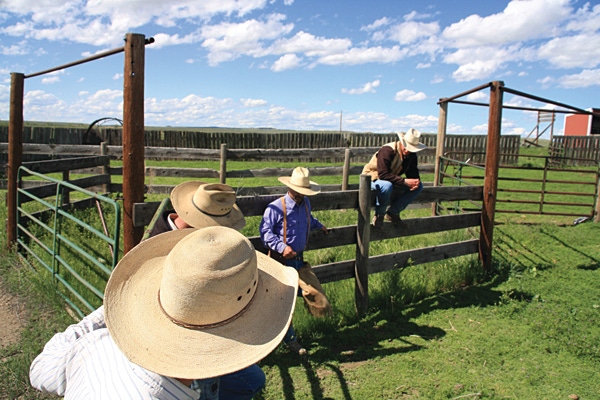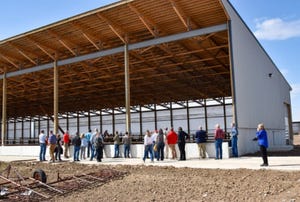Is Your Ranching Operation Business First Or Family First?
A look at some mistakes that break up a family business — and how to avoid them.
January 2, 2014

‘I want you all to make a decision. You have to decide: Do you want to be a family-first business, or a business-first family?” says family business consultant and farmer Jolene Brown.
Brown has consulted with more than 400 farm and ranch families, helping them create, protect, fix and/or transition their family businesses. She provides insight into the most common mistakes families make, and solid suggestions for improvement and success.
“Ninety percent of people are a family-first business,” she says. This concept is characterized by such comments as:
I think there’s a will, but I’m not sure.
The kids all got along fine until they got married.
We just operate based on tradition and assumption.
We were lucky — and in the right place at the right time.
“We need more than luck when it comes to family business assets. If you want to be a family-first business, that’s OK, but the business better be a hobby,” she says. However, for those looking to build a legacy that will support more than one family along the way, she highly encourages choosing to be a business-first family.
What is ‘business-first’?
Brown says a business-first family doesn’t demean the family, or mean that the business is more important than the family. Rather it indicates that members honor the family so much, that they work to get the business right.
“Just because you were born together doesn’t mean you should work together. Acceptance in a family is unconditional. Acceptance in a business is conditional and not a birthright,” Brown says.
She notes that if a person is angry, addicted, arrogant, lazy, or can’t seem to hold a job anywhere else, he or she shouldn’t be hired into the family business, either.
“Another important question that must be answered by the senior generation is, ‘Do they really want the business to continue?’ If they do, then they’ve just agreed to replace themselves.”
She advises that everyone in the operation should start in the business as labor, and from there move into management and then leadership. Then, at the pinnacle of the process, the leader becomes labor once again.
“This does not mean the next generation wants to turn you out to pasture. This means you have trained them so well that you now trust them to lead, and you give them your support. You’ll always be the mentor and wise master with experience to share.”
Subscribe now to Cow-Calf Weekly to get the latest industry research and information in your inbox every Friday!
However, she warns against starting this process with the mindset of needing cheap labor, or with the dream of bringing the kids back home. Rather, she explains, at the time the kids are added to the operation, a concrete plan resulting from discussion of compensation that is fair to everyone, current and future personal and business goals, and future transitions and expectations, should be discussed and
implemented.
Brown further notes that money certainly does matter. In addition to ensuring the business is financially viable and providing fair compensation to those joining the business, it’s also critical for the senior generation to solidify their financial security.
“You have to take care of yourself. Your kids don’t have to start where you are today — after all, you didn’t. But neither can they start where you started,” Brown says.
At the time of a person’s retirement, she says financial advisers suggest a minimum of 50% of income be derived from sources other than the family business. “If you don’t have that in place, you’ll micromanage the next generation to death because they’re dinking with your security. And if they screw up, you won’t have anything to live on. You want the next generation to take risks on money they can afford to lose,” she notes.
Six important questions
If the business owners and leaders agree that additional family members, namely the next generation, can and should be incorporated from a financial perspective, Brown suggests measuring each individual being considered against these six questions:
Number one is, if you want to come back to the farm or ranch and work, what do you bring to the business? Are you a great mechanic, herdsman or geneticist? Are you energetic and worthy?
Does the business need those attributes?
What does it cost the business to hire you? Do you expect health insurance or other fringe benefits — what are you going to cost the business, and does that cost equal your worth?
Have you worked for someone else for 2-3 years prior to working in the family business?
Does the person who wants to join the business still live at home? If so, say no to employment until they live under their own roof.
Does Mom still do the potential employee’s laundry? If yes, then don’t employ them.
“Ranchers often chuckle at the last two questions, but they are the beginning benchmark of emotional maturity. It’s in the best and long-term interest of all individuals and the business to hire a worthy employee, and not just a son or daughter. Hire employees wisely, because it’s hard to fire them in a family business,” Brown says.
Advice for youngsters
For the younger generation, Brown suggests they be kind, courteous and respectful, and work to exceed expectations and add tremendous value to the business. If the senior generation truly wants the business to continue, the result will be an intentional and gradual movement through the ranks of laborer, manager, leader and next owner.
“If you’ve been kind, courteous, respectful and exceeding expectations for six years, and nothing has changed from the day you started, run and go work somewhere else. Hope is not a good business strategy,” adds Brown.
Upon agreeing to bring members of the next generation onboard, Brown stresses that a conversation isn’t a contract.
“If it’s not in writing, it doesn’t exist,” she says. A young person can’t bank his or her future on a spoken promise; even among family, it pays to get things on paper. She cites these three “lies” as the most commonly told:
Work hard and someday this will all be yours.
I’m going to retire.
Don’t worry about your brothers and sisters; they have their own jobs and aren’t interested in this business.
Last but not least, Brown underscores the importance of an exit strategy, including what triggers it; who has the option to buy and in what order; how assets will be appraised; and a clear definition of payment terms (including interest rates). All these should be laid out and signed in a legal document.
“I believe that before transitioning ownership of assets, you should already have skin in the game, an education that is relevant of this industry, full-time employment within the business for three years, and a fire in your belly for the job,” she explains.
In conclusion, Brown says that while she doesn’t believe parents owe their children a business, there are four key things she does believe that children are owed by their parents:
First, morals and values, and an understanding of what is right and wrong.
Second, an opportunity for an education. Note, however, that I did not say you had to pay for it.
Third, develop and discuss legal plans for your estate, as well as business ownership and management transfer, and a buy-sell agreement. My opinion is your will is your own business, unless you said yes to wanting the business to continue and the assets of your estate affect the continuation of the business. At that point it cannot be private anymore. You must let the rules of the game be known. Your kids don’t have to like them, but they deserve to know them.
And, fourth, your kids deserve a listing of details beyond the will, such as what you want done with your body upon death, where important documents are located, passwords to accounts, etc.”
Brown acknowledges that personal relationships are tricky. “Just like you, the more I have to deal with people, the more I like cows! Yet it is the people that make beef production happen — not just today, but into the future. Let’s honor the family by doing the business right, beginning now.”
Heather Hamilton-Maude is a freelance writer and rancher in Caputa, SD.
You might also like:
Dont Bet Your Farm: An Estate Plan Can Help Preserve Assets
8 Estate Planning Questions To Ask
10 Best Photos Featuring Generations On The Ranch
You May Also Like

.png?width=300&auto=webp&quality=80&disable=upscale)
.png?width=300&auto=webp&quality=80&disable=upscale)
